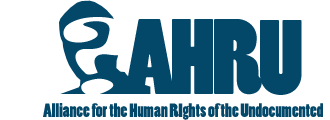Many people think that undocumented migrants have no rights since they are living without permission to legally reside in a country which is not their own. But it is a myth that undocumented migrants do not have any rights. The human rights of undocumented migrants are in fact articulated within a variety of instruments and treaties on both the international and regional levels.
Non-discrimination, together with equality before the law and equal protection of the law, constitute a basic and general principle relating to the protection of human rights. The Universal Declaration of Human Rights (UDHR) confirms that human rights apply to all persons, “without distinction of any kind, such as race, colour, sex, language, religion, political or other opinion, national or social origin, property, birth or other status.”
International human rights law is a set of international rules, established by treaty or custom, on the basis of which individuals or groups can expect and/or claim certain entitlements or benefits from governments. This body of law consists of the UDHR and the seven UN human rights treaties. Together these instruments represent the international standards for the respect and promotion of human rights.
PICUM works to ensure that, in accordance with international human rights law and national legislations, fundamental rights are not limited or denied to vulnerable migrants on the basis of their administrative status. In its daily work, PICUM promotes awareness of undocumented migrants’ rights, and strengthens the capacities of those within its network to defend these rights on the basis of equality and non-discrimination.
Basic Social Rights
Basic social rights are embodied in the International Convention on Economic, Social and Cultural Rights. In violation of this convention, states frequently limit or deny these rights to undocumented migrants on the basis of their administrative status.
PICUM aims to promote the basic social rights of undocumented migrants, such as:
- the right to shelter
- the right to health care
- the right to fair labour conditions
- the right to organise
- the right to education and training
- the right to a minimum subsistence
- the right to family life
- the right to moral and physical integrity
- the right to legal aid
Country Case Studies
The links below provide a general overview of undocumented migrants’ fulfillment of basic social rights in countries throughout Europe as well as in the United States. It should be noted that in many of the countries listed below, undocumented migrants do not even have the minimum of protection of their basic social rights. This is due to several factors, including laws which do not include undocumented migrants as beneficiaries of certain public services or the inability of undocumented migrants to access certain services even when they are stipulated in the legislation. The present overview is thus meant to give an overview of the fulfillment of basic social rights in theory as well as in practice.
Please note that where PICUM does not have any information concerning a particular basic social right in a particular country, there is an indication of “No information provided”. In addition, supplementary information can always be added to the various categories in each country. If you have any information concerning a particular basic social right, feel free to send it to the PICUM secretariat ([email protected]). PICUM will then put it on the website to ensure that the information provided is as complete and up-to-date as possible.

Leave a Reply